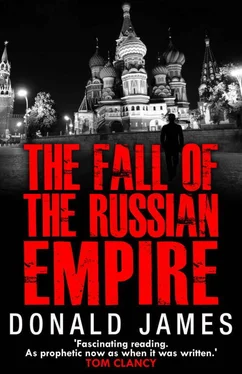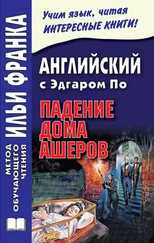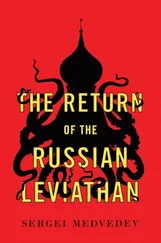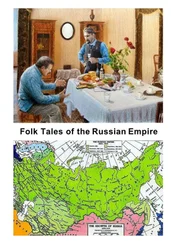On Anton Ovsenko’s signal the team shouldered their dripping workbags and began to haul the raft back along the dark tunnel.
In the great central vault, above the waterline, five or six other inspection teams had already gathered. A fire was burning in an iron brazier set on the brick floor. In its flickering light men passed quart bottles of vodka among them and chewed bread and sausage. As each new inspection team joined them a faint ironic cheer was raised.
When the last team arrived there were almost a hundred men gathered around the brazier. Cigarettes were lit, men talked in low voices. Others shuffled from group to group exchanging a few words, glancing expectantly at anyone who raised his voice.
“What’s it to be then, comrades,” a voice said finally from beyond the firelight. “Do we go on, or give in?”
“We go on,” voices from the darkness muttered.
“If we go on, we know what to expect from the authorities,” a man squatting beside the fire said.
Engineer Ovsenko’s youthful face glowed in the light of the brazier. “They can’t imprison every worker in Leningrad,” he said.
The man squatting beside the fire gulped vodka and wiped his lips. “We don’t have every worker in Leningrad backing us, comrade,” he said. “Not yet we don’t.”
“Let’s be practical,” another man said, “our task is to get Joseph Densky and the others released. Our first step is to elect a delegate to the Release Committee. Agreed?”
The men around the brazier looked down, scuffing their heavy rubber boots against the damp brickwork.
“No volunteers?” the man by the fire laughed harshly. “Nobody looking for ten years in a labor camp?”
“Some of us have children to think of,” another man said. “What future is there for them if their father’s in a camp somewhere in Siberia?”
Anton Ovsenko shouldered his way forward. He stood well above the height of most men around him. He had removed his work helmet and sweat plastered strands of blond hair to his forehead.
“I’ll go to the meeting,” he said. “I don’t have a wife or children.”
Men pressed forward silently to look at him. For a few moments no one spoke. Then the man squatting by the fireside stood up. “Those in favor of Engineer Ovsenko as delegate?”
The raised hands showed as black shadows on the encircling walls.
“So be it,” the speaker said. “Engineer Ovsenko is our delegate to the Release Committee. We in turn bind ourselves to act as that committee decides. Is that so, comrades? Yes or no?”
The hands rose more slowly this time, in ones and twos, or in clusters as friends and workmates voted together. But in the end every hand was raised.
“Speak for us then, Anton,” the man by the fire said, shaking Ovsenko’s hand. “And speak for Joseph Densky and the other Blue Bridge prisoners.”
Still a hundred yards or more from where the workers stood around the fire, deep in a long tunnel which led to the central vault, thirty uniformed men waded silently forward, the sodden skirts of their greatcoats trailing in the black water. They moved slowly, their eyes on the outline of the man ahead, his dark back silhouetted against the glimmering light of the kerosene lamps at the far end of the tunnel. The militia officer in the lead took his riot pistol from his holster. He could hear voices clearly now and even make out the shadowy figures of the men in the central vault. Straining his ears, he could almost hear what they were saying. But for just too long the effort absorbed his concentration. His boot, feeling forward, came down on a piece of fallen masonry. As he slipped, he shouted involuntarily, his arms flying as he fell forward into the still water.
In the vault the shout echoed and reechoed like a gunshot from the mouth of the tunnel. From other tunnels police whistles brayed.
Seized with near-panic, the men of the inspection teams plunged into the water and splashed along those waterways which seemed farthest from the approaching militia.
To men who had worked the tunnels all their lives the few seconds’ warning was invaluable. Like sewer rats they slithered into crevasses known only to them, or crouched in conduits with the water at the level of their chins. Others collided with militia units in the blackness, kicking and punching as they fought their way past. From time to time the beam of a flashlight would pick out a face, as a man rose, water cascading over his shoulders, to hurl a militiaman aside.
Within less than an hour the militia units were regrouping in the great vault. Their overcoats steamed in the heat from the still burning brazier. Some limped, others held soaking handkerchiefs to cut eyes and swollen lips. Among the six full militia sections involved, no one could claim a single prisoner.
Yet for the commander of the operation there was perhaps one small scrap of hope. The informer who had revealed the meeting to the militia claimed that during the fighting in the tunnels he had been able to identify, in a flashlight beam, a certain Engineer Ovsenko.
* * *
It was almost a week since Joseph Densky’s arrest. Every day, morning and evening, Zoya had queued at the militia headquarters for information, each time to be met with that cold and complete denial that the Blue Bridge demonstration had ever taken place.
* * *
Twice a day [Zoya Densky recounts] I would pass from anger to fear and from fear to despair. My mother’s courage astonished me, as had my father’s a week ago.
I suppose it’s some essential part of growing up to see, as if through some other eyes, your own parents as courageous or cowardly, attractive or ugly, stubborn or pliable. As people, in fact, and not simply as parents.
In this week I learned a great deal about them both. I learned of my father’s agitation for better working conditions and I learned of the attempts by the authorities to buy him off with promotions and offers of a larger apartment. Most of all I learned, often simply from the quiet pride in my mother’s voice, that my father was rapidly becoming a force for the local authorities to reckon with.
It was some five or six days after the arrests that we arrived back home one evening to find that my mother had a visitor. In our minute apartment she took him into the kitchen and for ten minutes they spoke in lowered voices. Then when the visitor had gone she had begun to prepare some bread and sausage, all the time looking at me in a way I found strangely disturbing.
After a few moments she sat down opposite me at the kitchen table.
“What is it?” I asked her anxiously. “Did that man bring news?”
“Of your father? No, Zoyushka,” she shook her head. “Other news.” She was rolling the bread and sausage in a white cloth. She placed a half-quart of vodka next to it on the table. “There is a man,” she said, “who has been trying to help your father. Tonight he needs our help. The militia are watching his apartment He has had to go into hiding.” She nodded to the things on the table. “Will you take these to him?”
I felt, of course, immensely proud of having been asked. Although half an hour later as I picked my way in the half-dark across a vast demolition site on Vasilyevsky Island my pride quickly gave way to alarm.
The wind rattled the thin metal lampstandards along the shoreline, driving inland scattered rags of sea mist so that it hung like battle smoke around half-demolished buildings. Small fires burned among the debris and groups of ragged men sat around them passing the vodka bottle. Known ironically as Vasilyevsky Park, it was a place of beggars and outcasts. All those who lived outside the system lived here, men without city residence permits, aging whores, professional beggars. The vast broken area functioned as the thieves’ quarter might have in other cities, in other times.
Читать дальше












